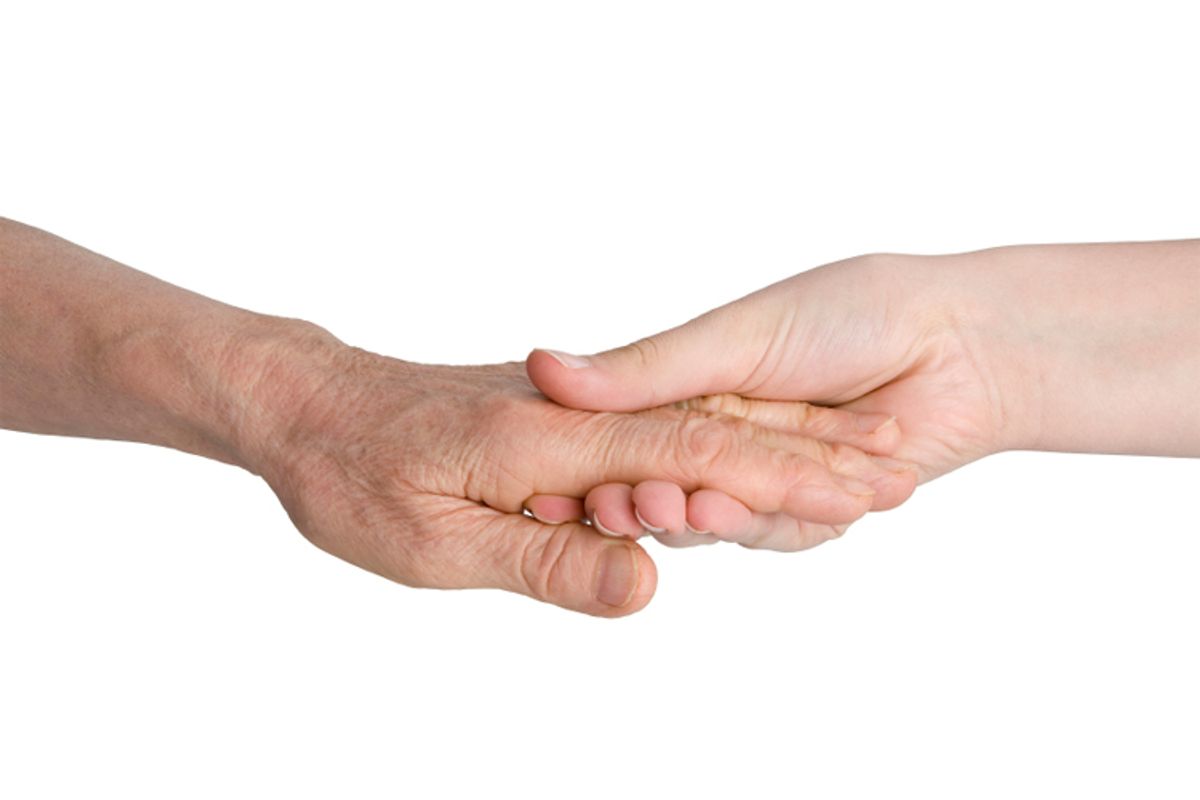I hadn't thought much about my mom's body -- the location, strength and movement of her bones, the marrow inside them and the muscles surrounding them. Not until discovering that she has metastasized lung cancer.
Suddenly, she was reduced to a series of lettered and numbered bones -- some of them fractured, some with lesions. A bone scan showed her skeleton with glowing white spots scattered from femur to collarbone. The MRI detailed the troublesome spots: T3, T11, L2, L5, the right sacrum and the femur. At first, I repeated this medical jargon to anyone who would listen and watched as their eyes glazed over. To them, these were meaningless letters and numbers; to me, they were everything.
Through several Google searches, I located each of the diseased bones in diagrams and x-rays of unnamed strangers' bodies. It was like reading the human anatomy section of my high school biology textbook all over again. I unconsciously touched my own body as I identified each part: the third rib (my fingers pressed into the flesh of my chest, noting the thump-thump of my heart), a vertebra mid-back, two more vertebrae in the lower back, the very base of the spine and then the thighbone.
The full-body CT scan revealed her intestines, uterus, diaphragm, heart and lungs. I clicked through the sequence of cross-sectioned images, passing from the top of her rib cage, through her lungs -- past the tumor wrapped around her esophagus and the thick pool of fluid at the bottom of the left lung -- down to her diaphragm, and then back up again, over and over. What a strange thing: I came from inside her, only later to see inside her. Bone of my bones and flesh of my flesh; it goes both ways.
Since drawing the road map of my mom's body, I've started to notice the veins in my own hands and think, with horror and awe, about the blood flowing through them. I see bruises on my body in a whole new way, delighting in their shape and color. It's like being suddenly thrust into the "Bodies" exhibit, where preserved human cadavers are stripped down to show the skeleton, muscular system and circulatory structure -- only they are all her, they are all Mom. It makes me think of catching frogs on childhood camping trips, peeking into a loosely held fist to see a heart beating behind alarmingly delicate and translucent skin.
I imagine this is what it must feel like to be a mother. At least, it seems to have been that way for my mom. I was born premature with wet lungs, and she spent the first few months of my life worried that she would break my delicate legs while changing my diaper. When I was 12 we were hit by a car while crossing the street. She saw it coming -- I only heard the screech of tires -- and she reflexively wrapped her arm around me and pulled us onto the hood of the car. "I just kept thinking about your delicate little skull. I just kept thinking, 'That skull cannot go under this car,' " she told me afterward. My mom has spent a lot of time thinking about my bones and my lungs; now the favor is returned.
I search for parallels, and there are so many: I listen to her labored breathing during naps, just as she worried about rolling over and suffocating me as a baby in the middle of the night. When she zones out on morphine -- lips pressed together but jaw hanging, fingers scratching at the sheet -- it echoes all those trips back from the dentist's office, my face numb and saliva pooling on my bottom lip. While she throws up into a plastic bag in the living room -- which is now anchored by a hospital bed -- it's all too easy to think of all the times I have vomited from the flu while sitting on that couch.
It's also true that she is the same age her mother, Quen, was when she died of ovarian cancer. I grew up hearing stories about the waking nightmare of seeing her mom steadily lose weight until she looked like a concentration camp victim, and the irony that, as she wasted away, the tumor in her belly grew as though she were pregnant with life. I was born just after Quen died, and now her memory lives on in my middle name. But how many of these touching symbols are real, and how much of this is just me analyzing life like literature, trying desperately to make sense of it, to provide some sort of character arc that makes it OK? The truth is that it is profoundly not OK. Cancer is poetic, but it's also fucking bullshit. Two contradictory things being true at once -- that's something my mom has always delighted in.
By mapping out her body, and taking care of her in the most minor of ways in the year since her grim diagnosis, she has become less of a superhero and more of a human to me. She's just a girl from Indiana who fought with all her might to avoid making the same mistakes her mom made, and to give me the family she never had. This perception shift on my part is my way of preparing to be a mom to myself. I already do OK at that -- for a 20-something of my kidult generation -- but it will be a very different thing when she's gone. Breaking my mom down to a molecular level makes me think that maybe, just maybe, I can do it -- and eventually even discover how I will fit into the larger maternal narrative. I just wish she could be there to see it too.



Shares